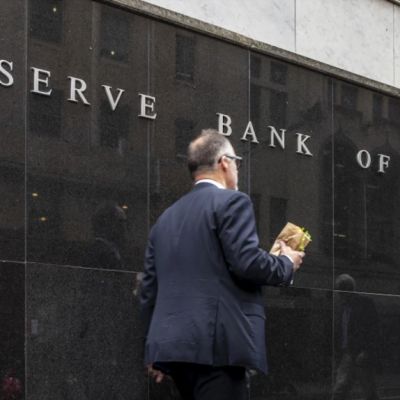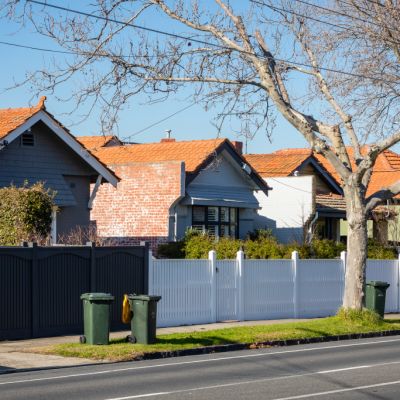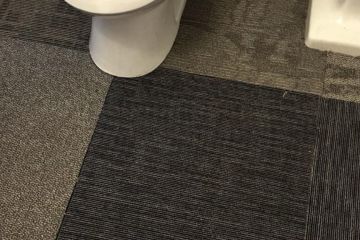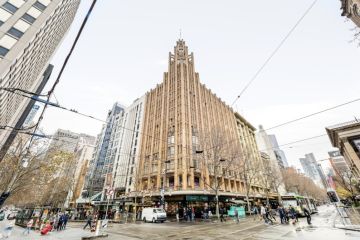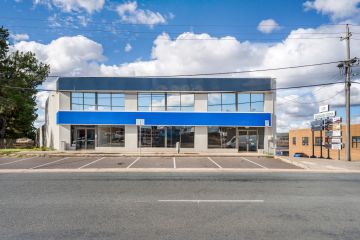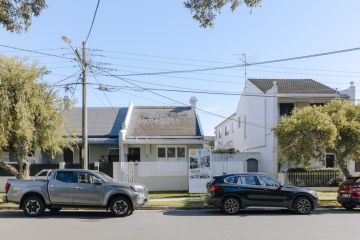Tiffany bought her first home but didn’t expect the mortgage to go up so soon

Tiffany and Josh Jamieson were excited about buying their first home, but they didn’t expect their mortgage repayments to go up so soon.
The couple, both 29, built in Melbourne’s outer south-east last year. They expected to have a couple of years of record-low interest rates to start paying down their mortgage after Reserve Bank governor Philip Lowe said he did not expect rates to rise before 2024.

In less than a year, they faced their first interest rate rise. The cash rate has gone up for five months in a row including by another 50 basis points on Tuesday to 2.35 per cent, leaving many first homeowners who bought at rock-bottom interest rates facing higher repayments, earlier.
“We were obviously not expecting it to happen this soon,” Ms Jamieson said. “We were sort of prepared for the rises and were doing things like installing solar panels to reduce our electricity costs, and we got finance for an electric car to cut petrol costs.
“[But] it has just screwed us up. We’ve had to cancel all our charities because we can’t afford to pay the mortgage if we keep donating.”
The couple welcomed their first child, Daniella, two weeks ago and were hopeful that Ms Jamieson, a qualified librarian, would be able to do further studies. But those plans may have to change.
“Financially we don’t have an option for me to be a stay-at-home mum, so I will be going back to work,” she said.
Rate City research director Sally Tindall said families like the Jamiesons would be feeling the pain, including those coming off a fixed mortgage rate.
The soaring cost of living after natural disasters and the COVID-19 pandemic forced the RBA to raise rates much sooner than planned, she said.
“It’s just a tricky time for a lot of families,” Tindall said. “It’s going to put a lot of families under the pump.”

Though banks had assessed borrowers’ capacity to repay loans as rates rise, some would have to change their lifestyle due to the higher repayments, she said.
In Melbourne, a first home buyer who bought a median-priced unit in July last year and fixed their loan for two years at an average rate of 1.94 per cent could now expect to roll over to a rate of 6.74 per cent once their fixed term ends next year.
Their loan repayments would jump by $1279 per month, RateCity modelling shows. Even if they switched to the lowest big bank variable rate, they would need to find an extra $839 a month.
Someone who bought a median-priced house at the same time and negotiated for a better deal next year would face a jump of $1325 per month.
Tindall said now house prices are falling, some buyers won’t qualify for refinancing if their loan size is more than what their property is worth. Those that do qualify but have equity of less than 20 per cent may have to pay the extra cost of lender’s mortgage insurance.
Managing director of Boulevard Finance Loan Market, Daniel Koutzamanis, who worked with the Jamiesons, said people who had borrowed earlier in the pandemic on record-low interest rates were now facing much higher rates when looking to fix again. Some were choosing a variable rate instead.
“There’s a bit more apprehension for those looking to buy their first home – they’re putting it on hold to see what happens with interest rates,” he said.
Some new owners are unsure how to tackle rising repayments.
First-time buyer James Emery got an “exceptional” deal on his mortgage when he bought an investment property in Seaford last year.
The 27-year-old small business owner had been looking for a property to purchase for a while and was watching prices rise over months of lockdown.
When interest rates came down he decided to increase his loan amount to buy in a more expensive area than where he had been looking previously.
“All the talk was that it was going to stay low for quite a few years,” he said. “So I borrowed what I could and got the best rate and was under the impression that it was going to stay that way.”
The fixed-rate portion of his loan expires in March, after which his monthly repayments will increase by a couple of hundred dollars.
“It’s going to leave a massive hole in my pocket, which I don’t necessarily know how I’m going to afford yet,” he said.
His broker, Mortgage Choice South Melbourne’s Paul Williams, said the rate rises would tip many people over the edge, especially those who had pushed themselves to get their loan.
“They’re realising they’ll have to shop around to get a better rate,” Williams said, adding some had decided not to go ahead with planned renovations.
Commonwealth Bank’s head of Australian economics Gareth Aird said rapidly rising interest rates will leave more households in a tough position.
“It’s not just first-home buyers, but it’s also people who traded up during the pandemic,” Aird said. “For a lot of households, they will have less money available to spend on goods and services in order to meet mortgage repayments.
“The higher [the RBA] takes the cash rate, the more households that will find themselves in this position.”
Aird said many households and businesses borrowed money on the assumption the RBA’s statement of holding rates until 2024 was a commitment and not a conditional statement.
“There was no sense that rates would go up as quickly,” he said.
We recommend
States
Capital Cities
Capital Cities - Rentals
Popular Areas
Allhomes
More
